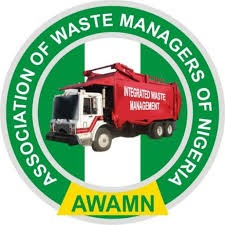The Association of Waste Managers of Nigeria (AWAMN) has called for an environment enabling its members to deliver efficient and effective waste management in the state.
Mr Olugbenga Adebola, President (AWAMN), made the call in a chat in Lagos.
Adebola said that effective and efficient waste management requires commitment and collaboration between the government and the private sector participants (PSPs) operators.
He added that the duo should sit down and chat about a course to remove the challenges in the waste management value chain.
He expressed gratitude to the Lagos State Government, through the Lagos Waste Management Authority, for graciously committing to providing compactor trucks to PSPs on the lease-to-own model.
“We would like to thank the LASG, the Managing Director of LAWMA, who has graciously announced to the world that they are buying compacting trucks on a lease-to-own basis for PSP operators.
“I think it is a good gesture. However, I regrettably want to say that this is not the only solution to effective and efficient waste management, perhaps 10 to 15 per cent.
“Having an effective and efficient waste management system operating in Lagos state goes beyond just purchasing trucks for the PSP owners on the lease to own.
“Around Oct 2023, we sent a comprehensive letter to the government, identifying some of the problems militating against effective and efficient waste management in the state. As professionals, we aim to identify some of these problems and perhaps find a solution,” Adebola said.
He noted that around Oct/Nov 2024, the association wrote another letter reminding them of the issues.
“We explained to the government that we would have made progress if we could address some of the raised issues. Here we are with the narrative of trucks for lease; we don’t know what the would-be trucks are made of.
“The current truck used by LAWMA was purchased from Sino Trucks. We co-designed the car to tell them the engine size because of the diesel we have in Nigeria.
“While the whole world is using Euro 10, Euro 12, and Euro 13, in Nigeria, we can’t use that, and we sat down with the manufacturers to tell them what kind of diesel engines we can use in Nigeria.
“We told them how low the bed could be and why they could also build a back for the attendants to sit, so we solved the problem of hanging at the back of the truck. These are the things we did with the previous truck.
“We should be part of this new arrangement, especially since these trucks are coming on a lease-to-own basis, which means that you own by paying; it is not free.
“If we are going to pay for it, the operators need to be involved to have something that would suit us.
“How long-lasting and sustaining are those trucks? Are they CNG trucks? Are they trucks that are going to run on diesel? What chassis are they made of?
“We don’t know all of these, so we are reading it on the pages of newspapers,” Adebola said.
According to him, the trucks are not a total solution.
“If you are getting a lease to own a truck, what mechanism is in place to ensure that you also have an effective and total cost recovery?
“How are you able to recoup and recover savings to be able to pay for the truck? Otherwise, it would turn into a bad debt.
“With the current charges prevalent in the state, I am afraid you cannot break even,” Adebola said.
He noted that the enabling environment begins with the agreement, Memorandum of Understanding (MoU) between the government and the PSPs.
“If I am investing vast sums of money, how long will it take me to recoup such money with reasonable profit and repay such a loan?
“What mechanism is in place that ensures every waste generator actually pays for waste disposal, and where it is known that this is the lowest of the lowest of the economy, then the government must come in?
“What agreement was given to Vision Scape Services (VSS)?” Adebola asked.
He noted that the government paid VSS when Vision Scape handled waste management under the Ambode regime.
“As an investor, knowing I have a guaranteed sum of money coming into my account every month will help.
“Right now, many operators who went to the bank and got loans of 27 to 33 per cent cannot repay, and this is not the type of funding that can support effective and efficient waste management.
“You need green funding. Some will be grants and single-digit interest loans, but they must be long-term.
“If you go outside the country, people in this type of business get loans at three, four or five per cent interest, and sometimes the tenure is over 20 years.
“You cannot go to a commercial bank in Nigeria and get such a loan,” Adebola said. He added that waste managers are essential service providers and should receive special funding from the state or federal government.











